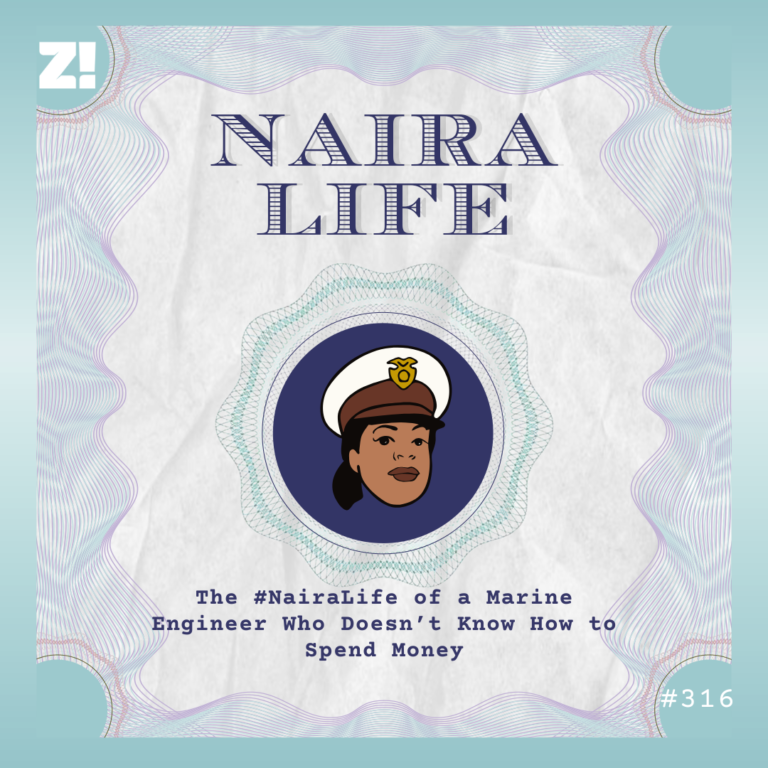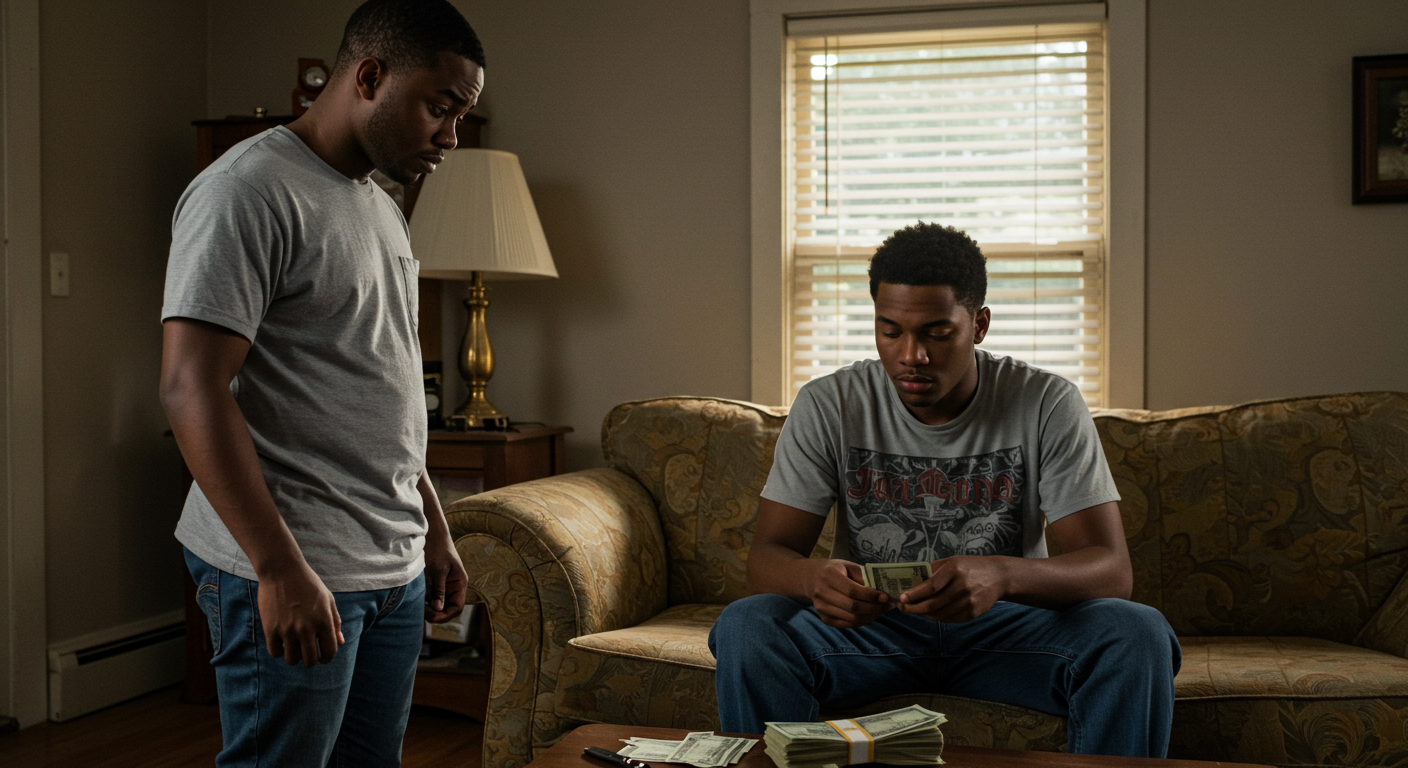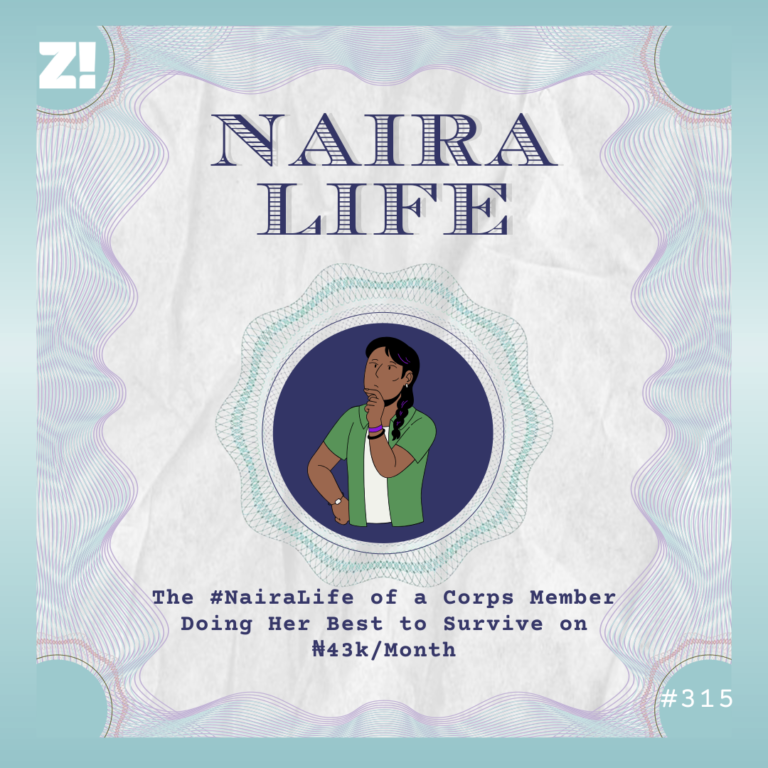Every week, Zikoko seeks to understand how people move the Naira in and out of their lives. Some stories will be struggle-ish, others will be bougie. All the time, it’ll be revealing.
Oya, time to face your money wahala! Are you a baller or just full of grammar? Take the Leadway Fincheck quiz and find out if your pocket is hot or your village people are working overtime. It’s time for Check Up. Are you an Odogwu or a brokie? Let’s find out.
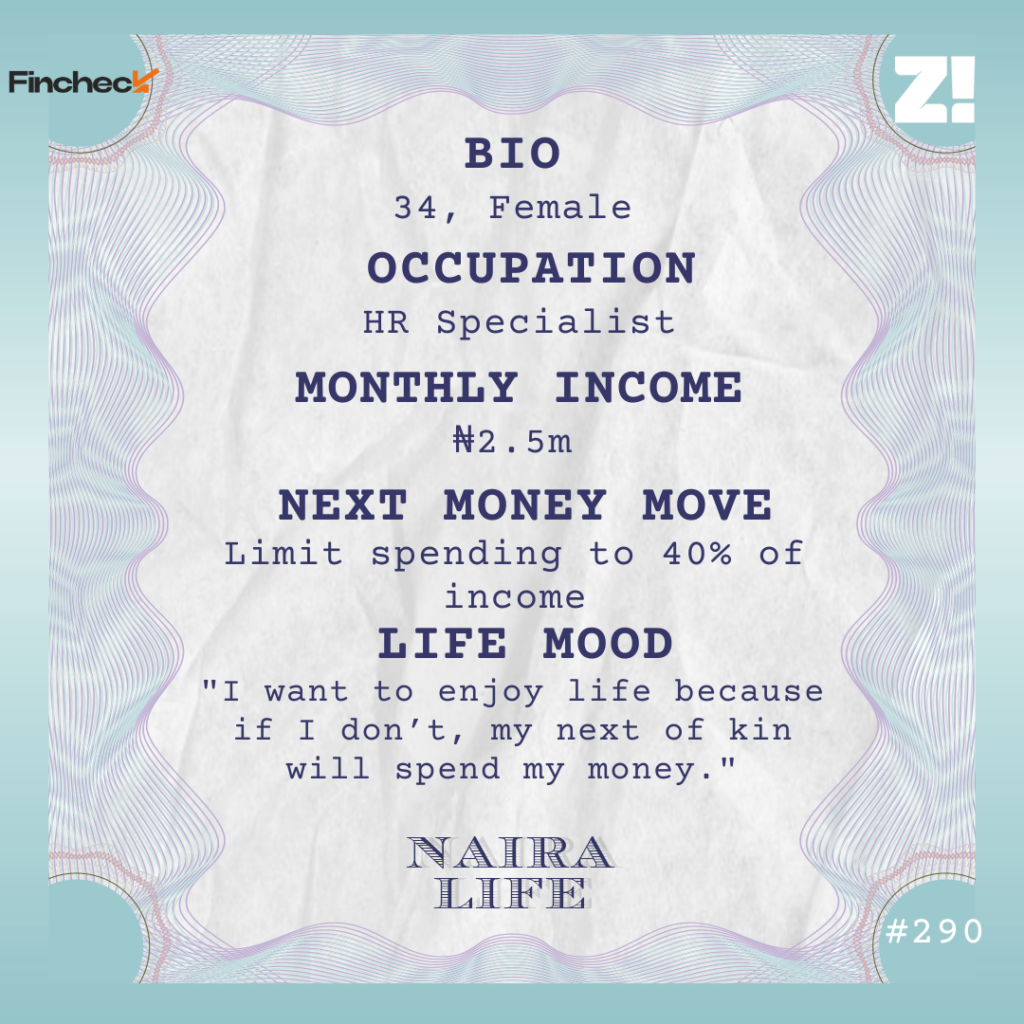
When did you first realise what money could do?
It has to be when I transitioned to boarding school in primary three, and my classmates started treating me differently. Boarding students paid more than day students, and my school saw boarders as being on a different, higher level.
I realised money creates a level of classism, if that makes sense. Money wasn’t really something we talked about at home, probably because I come from a broken home. My dad only came around to drop food and clothes and pay school fees.
Let’s talk a bit about the family situation
I’m the first child, and my earliest memories of my parents were their fights. Their marriage was pretty toxic, and they eventually separated when I was in primary school. My dad moved to another state but visited every three to four months. He spent the weekend with my siblings and me during those visits.
He remained the breadwinner even after the separation; his job with the federal government meant he earned more than my teacher-mum. My siblings and I went to the best schools and didn’t really lack anything.
But my parents weren’t the ones to care about their children’s emotions. My dad’s own was to make sure we were well-fed and in school, while my mum took out her aggression and annoyance with my dad on us— mostly me because I’m the first. Even though we lived together, my mum and I didn’t have much of a relationship. I was closer to my dad because he was financially responsible for us.
After I graduated from secondary school in 2008, I moved in with my dad and got first-hand experience of how hard he worked. He constantly picked up different side gigs and quickly moved up the corporate ladder. Watching him influenced my work ethic; how I saw money and the importance of working for it. I appreciated those lessons more when I started working for money.
When did that happen?
2012. I moved to the UK to study law, and to sort my feeding expenses, I first worked as a customer service rep at a McDonald’s. My pay was £7/hour, and I worked 20-hour shifts every weekend for a whole month to make £450 after tax.
It was a wake-up call to notice just how much my dad sacrificed for me and my siblings. My school fees was £17k/year plus another £700/month for accommodation, and he was also putting my two siblings through school abroad and paying for their accommodation as well.
This is random, but my dad has a saying, “I’m not waiting for the fruits of my labour on my children. I’ll eat my fruits now.” I grew up knowing that while my dad would provide for us, his money or properties weren’t mine. I’d have to work hard for what I wanted because my dad didn’t expect me to bank on him for anything besides the basics. Moving to the UK made that extremely clear.
I see. Were you at McDonald’s for long?
Not really. I worked there until my second year in uni. Then, a friend introduced me to care work with the NHS (National Health Service). I got a job as a healthcare assistant, and my salary was around £800 – £1k/month. During the summer, I earned more because I could work up to 40 – 60 hours/week. I was with the NHS until I finished my degree and the extra year it took to get my master’s degree.
My salary was enough to cover my living expenses and short summer trips to European countries with my friends. I also started sending money home to my mum during this period. She didn’t earn much as a teacher, and I thought I had to support her. I even helped her change apartments and contributed to her getting a car.
I finished my master’s in 2017 and returned to Nigeria the following year to start my professional career.
Was the plan always to return to Nigeria?
I didn’t want to, but my dad wanted me to go to law school so I’d be licensed to practise in Nigeria.
However, working in the NHS made me realise I enjoyed administrative work and speaking to patients. With the help of one of my uni professors, I decided that the best career path for me was human resources. After that, I did an 18-month online CIPD certification and became a certified human resource personnel in the UK. This was in 2017.
What did your dad think about that?
He didn’t understand why I’d get a law master’s degree and decide not to practise.
Thankfully, an uncle intervened, and we came to a compromise: I’d intern with a law firm in Nigeria to figure out if I wanted to work as a lawyer.
How did that go?
I interned for four months, and the firm paid me ₦40k/month. Two months into the internship, the firm’s partner told me plainly that I wasn’t built to be a lawyer. It was obvious my mind wasn’t there.
I told her about my HR career aspirations and she advised me to attend law school because a good HR personnel needed to understand the labour implications of the profession.
So, I went to law school in 2018 and got called to the bar in 2019. My dad sustained me through law school with a ₦70k/month allowance. I had about ₦500k in my savings but I didn’t have to touch it because of the allowance, not until I left home in 2019.
Why did you leave home?
My dad wanted me to take a legal personnel job at his workplace, and I didn’t want it. We butted heads over it, and it was clear I couldn’t remain in his house and disobey him. So, I moved in with a friend and planned to live on my savings till I found a job.
Fortunately, I found one as an intern at a management consulting firm. They paid me ₦50k/month because of my master’s degree. Apparently, they paid interns ₦40k.
The money wasn’t great, but I had no major responsibilities. I still stayed with my friend, and while I pitched in, it wasn’t a financial burden.
But the work? It was hectic. I had to figure out many things myself. I was also super intentional about building relationships, and I attended every single HR event and was in the LinkedIn DMs of every senior HR person. I was determined to build a solid HR career.
Love the energy
I got my next job with a stroke of luck and faith. Towards the end of 2019, someone referred me for an executive assistant role that offered ₦200k/month, but I rejected it because I’d be a glorified errand girl. Everyone thought I was mad.
But then, a week later, I applied to a multinational company. In January 2020, I was employed as a human resources officer, and the salary was also ₦200k/month. After the three-month probation period, my salary increased to ₦300k and then to ₦400k after six months.
Whoosh. That’s a decent jump
I know, right? And I still didn’t have to pay rent. My friend who accommodated me relocated in April 2020, but a mentor offered me a space in her home so I could save my money.
I didn’t pay rent until 2022, when I got a ₦1.8m/year shared apartment. From 2020 to 2022, I comfortably saved ₦200k/month.
Most of my savings went into crypto and stocks.
Were you trading crypto?
I was just flipping the coins. If I bought ₦100k worth of coins and found out it was worth ₦150k the next day, I’d remove the ₦50k, spend it as free money, and buy more coins.
I didn’t really touch my stocks, though. I also saved a small percentage in a savings app. At the end of the year, I’d gather my savings to travel for a holiday in the UK.
When I left the multinational in 2022, my salary had grown to ₦525k/month.
Why did you leave?
An international company poached me and offered me double my salary. My new salary was ₦1.2m with stock options, and I could work remotely. It was a no-brainer.
But you know how they say, “The more money you earn, the more your problems,” right?
Let me guess, new income came with a new lifestyle
It did. I moved to a ₦2.5m/year apartment, excluding service charges and other dues. There were other small lifestyle changes, too — spending a little more here and buying a few more things there.
Then, the 2022 crypto crash happened, and I lost about ₦2m worth of my crypto investment. I also invested ₦1.6m in an agric company that folded up. In 2023 again, I took a ₦4.5m loan to help an ex raise the proof of funds he needed to japa. He blocked me after relocation, and I’m still repaying that loan.
Yikes
It’s my biggest financial regret till date. I pay ₦410k monthly and should be done in November this year.
I haven’t really felt the impact of the loan deductions because I got an extra income source in November 2022. My job had started to feel monotonous, so I took up a part-time HR consultant role that pays me an extra ₦1m monthly.
But my salary from my 9-5 has reduced. The company hit a rough patch early this year and laid off staff. I didn’t lose my job, but they cut my hours to 20 weekly, and my employment is now on a contract basis. My salary went down to ₦930k/month, and I get a quarterly ₦1.8m bonus.
I also get occasional small recruitment and startup advisory side gigs that bring roughly ₦500k/month.
Right now, I’m sure of at least ₦2.5m monthly from my jobs and side gigs.
How do you feel about that?
I can afford most of what I want. But am I comfortable? Nope. I don’t think that’s even possible in this country. I want to earn more, and I’m looking to get a foreign-currency paying job, so I can hedge against inflation. For instance, I can’t travel to the UK this year for holiday because I can’t afford it any more. I could afford it in 2020, and I wasn’t earning as much as I do now. Maybe I’ll make do with Ghana.
Black tax is also at an all-time high. I have ₦1m in naira savings, because I spent roughly ₦5m on my brother’s wedding a few months ago — as per first child.
My mum is also really entitled. I give her a ₦100k monthly allowance and also pay her ₦500k rent, but she’s constantly asking for more money. Sometimes, she sends her bank statements to show she’s broke so I can cough out money. I recently installed solar electricity at her house, bought a generator and bigger TV, but the expenses never end.
It’s safe to say you aren’t pleased about it
I’m definitely not. We never had much of a relationship, and she was never financially responsible for me, so most of the time, I feel like my mum doesn’t deserve my money. I’m not happy about it. I just give her because I have a conscience.
My dad and I got back on talking terms after I got the international job. I prefer to spend my money on him, but he has no use for it. I try to make up for it by buying him stuff when I travel or for his birthday.
But my mum? Nah. She doesn’t deserve it. In fact, what I do now is block her after sending her monthly allowance so she doesn’t call for more money. Then, I unblock her when I’m ready to send her more money. That’s basically our relationship now.
I think now’s a great time to break down what your monthly expenses look like
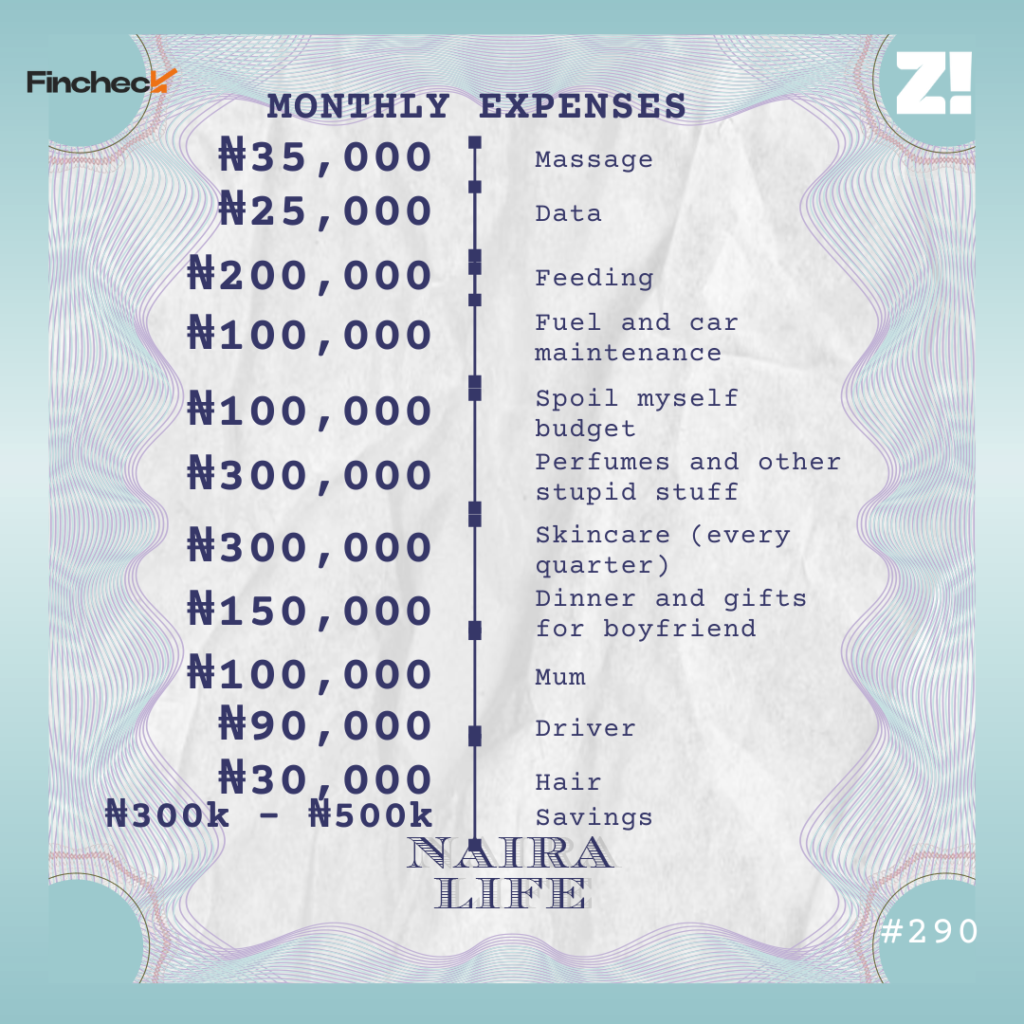
Asides my regular savings, I religiously save my quarterly bonuses from work. My savings portfolio is spread around stocks, dollars and naira in a savings app.
Oh, I got a car last year, which explains my car expenses. Funny story about that car actually. It’s a 2016 Toyota Corolla worth ₦16m in 2023, but I only spent ₦4m on it. My dad added the remaining money.
How would you describe your relationship with money?
I’d say it’s a give-and-take situation. I believe my money is supposed to work for me. I won’t say I’m not touching my salary because I want to be prudent. I work hard for my money, so I should be able to use it to take care of myself. I want to enjoy life because if I don’t, my next of kin will spend my money. That’s why I’m always looking to earn more.
Is there an ideal amount you think you should be earning?
At least ₦4m-₦5m, and if it’s in dollars, $5k. That’s when I can confidently claim to be comfortable. I’ve told my boyfriend I need to earn that before marriage because I want a certain lifestyle for myself and my family. I know people earn that much in Nigeria, and I’m sure I can get that, too.
Is there anything you want right now but can’t afford?
I want to buy a house with my boyfriend because marriage can happen soon. But I also know there’s no way we can afford ₦80m – ₦100m for a house with our current incomes. So, I’m considering mortgage options. It’s not set in stone, but we’ll probably go through the National Housing Fund (NHF) route because bank loan interest rates are crazy right now. The NHF gives loans based on the individual’s income and repayment can take up to 20 years or more. I should be able to get about ₦20m based on my income.
Is there anything you wish you could be better at financially?
Impulse spending. I’d be happy if I could limit my spending to less than 40% of my income. Last month, I spent about ₦500k on perfumes alone, and online shopping doesn’t help. There’s always one vendor selling stuff at discount prices, and it feels like a deal I shouldn’t miss. Before I know it, those expenses accumulate. I’ve muted all my Instagram vendors and hope to avoid online shopping for this month, at least.
How would you rate your financial happiness on a scale of 1-10?
7. I’m not living paycheck to paycheck, but I can do much better.
If you’re interested in talking about your Naira Life story, this is a good place to start.
Find all the past Naira Life stories here.



